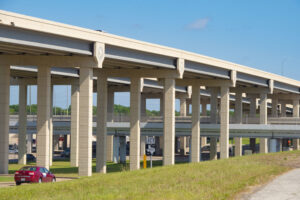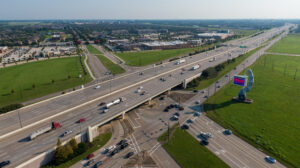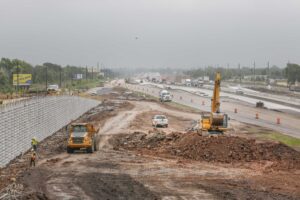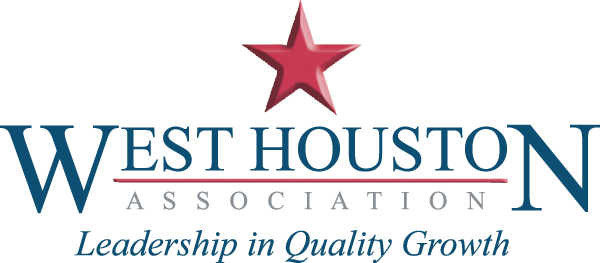
The expansion of toll roads and highways in Fort Bend County stands as a strategic initiative which is delivering substantial regional benefits in terms of development, connectivity, and economic growth. As one of the fastest-growing counties in Texas, Fort Bend faces increasing demands on its infrastructure. Enhancing the mobility system is vital to managing this growth effectively and sustainably.
Expanding toll roads, highways, alongside public transit alternatives serve as a powerful catalyst for development, opening access to new land and facilitating the creation of neighborhoods, shopping centers, business parks, and other economic drivers. In the Houston-region, such expansion helps to accommodate affordable and attainable housing by allowing for development to occur in areas with a lower land purchase cost.
The rapid population growth in Fort Bend County underscores the urgency of these infrastructure projects. In 2010, the county’s population was approximately 542,000. By 2020, this number had surged to 791,000, and as of 2024, it stands at over 900,000, marking a growth of about 60.1% over the 14-year period.
Adding to the complexity of transportation in Fort Bend County is the inclusion of portions of some of Texas’s most congested highways. As mandated by the Texas Legislature, TxDOT annually produces a list of the top 100 most congested highways, ranking them using person-hours of delay per mile and truck delay per mile as primary performance measures. Notably, a segment of Grand Parkway (SH 99) from South Fry Road to Morton Ranch Road is featured in this list, as is the majority of IH-10 which connects northeast Fort Bend to Harris County – highlighting the need for continued investment in and expansion of the transportation infrastructure to alleviate congestion and improve traffic flow.

Additionally, the demand for Fort Bend County’s transportation transformation is evident when looking at I-69. According to the TxDOT Statewide Planning Map, the projected AADT (Annual Average Daily Traffic) based on 2022 volumes will grow by 71% by the year 2042. This significant projected increase underscores the importance of addressing future traffic demands effectively.
“This increase in congestion is a major reason why we continue to evaluate multimodal solutions for Fort Bend County,” said Fort Bend County Transit Director, Perri D’Armond. “As the county’s population continues to grow, we need to invest in multimodal options that focus on reducing travel times and easing congestion.”
Projects of regional significance, those that impact the entire Houston-Galveston region, play a crucial role in connecting communities within Fort Bend County and beyond. Starting at the confluence of Harris and Fort Bend County, and heading deeper into Fort Bend, these projects include:
- Grand Parkway Segment C: Connecting SH 288 to IH-69, this environmentally approved but yet-to-be-constructed segment will significantly improve connectivity.
- TxDOT’s widening of US-90 and IH-10: These projects aim to alleviate traffic congestion between Brookshire and Katy.
- METRO’s Missouri City Park and Ride: This under-construction 1,750-space facility, integrated into NewQuest’s Fort Bend Town Center, enhances commuter options.
- Fort Bend County Transit Downtown Route: Fort Bend County Transit has initiated a new park and ride route, connecting southwest Sugar Land to downtown Houston.
- FBCTRA’s Westpark Toll Road extension: Extending from FM 723 to near Fulshear, this project supports expanding residential and commercial areas.
- FBCTRA’s Fort Bend Parkway Toll Road extension: Initial plans extend from Sienna Ranch Road to the Brazos River, with ultimate plans to reach SH 36.
- Highway 36A development: Connecting Port Freeport through Fort Bend County to US 290 in Waller County, this project supports regional freight and shipping needs.
These projects support cities and master-planned communities in the region such as Katy, Brookshire, Richmond, Rosenberg, Mission Bend, and Cinco Ranch, while also facilitating new development in residential, commercial, and industrial sectors. As freight and shipping hubs continue moving west along the IH-10 corridor, expanded roads enhance access between suburban communities and major employment centers like the Texas Medical Center, Downtown Houston, and the Energy Corridor.

The economic benefits of expanding toll roads and highways are substantial. Efficient transportation infrastructure is a key factor in attracting businesses to the region. Companies prioritize locations with reliable road networks for smooth operations, whether for goods transportation or employee mobility. New businesses contribute to the local economy’s diversification, creating jobs, boosting incomes, and enhancing overall economic resilience.
“As Fort Bend County continues to grow exponentially, our investment in mobility and infrastructure has been instrumental in fueling our economic momentum,” said Fort Bend County Judge KP George.
Moreover, toll roads generate revenue that can be reinvested into maintaining and improving the county’s transportation infrastructure. This self-sustaining model ensures continuous development and upkeep without heavily burdening taxpayers. Enhanced highways also foster social integration by linking diverse communities, making it easier for people to attend cultural, social, and sporting events across the county. Improved connectivity supports emergency services, ensuring quicker response times and better access to healthcare facilities during critical situations.
The expansion of toll roads and highways in Fort Bend County is more than a transportation project; it is a comprehensive strategy for fostering development, enhancing connectivity, and driving economic growth. By investing in better road infrastructure, the county can ensure sustainable growth, an improved quality of life for its residents, and a robust, diversified economy. The benefits of such investments are far-reaching, laying the foundation for a prosperous future for all of Fort Bend County.
Learn more about these initiatives at the West Houston Association’s upcoming breakfast forum, Connecting Communities: The Impact of Toll Road & TxDOT Expansions in Fort Bend. The event will feature discussions on these projects, the development they have enabled, and how these mega projects are coming together, from financing and interlocal agreements to operations and maintenance. Featured speakers include Grady Mapes, TxDOT Houston District Director of Transportation Planning and Development; David Gornet, Executive Director of the Fort Bend County Toll Road Authority; Jay Sears, Managing Partner of NewQuest Properties; and Jim Webb, Chief Executive Officer of The Goodman Corporation.
Written By the WHA Regional Mobility Committee
